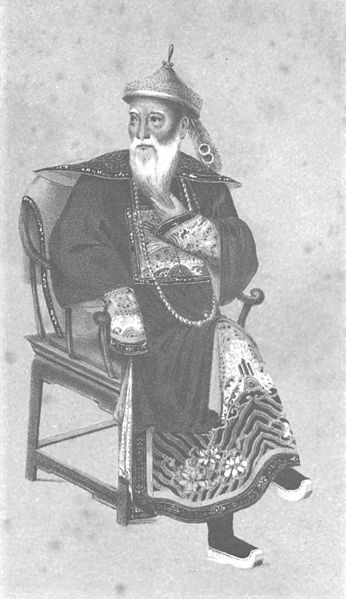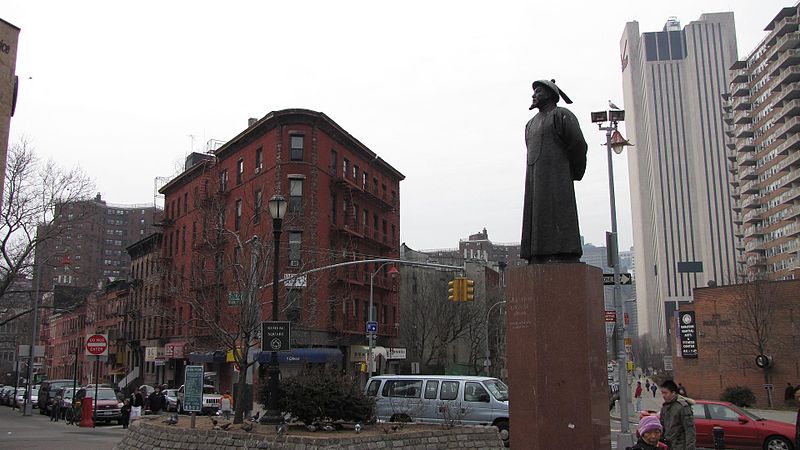<Back to Index>
- Viceroy of Liangguang Lin Zexu, 1785
PAGE SPONSOR


Lin Zexu (Style name: Yuanfu; 30 August 1785 – 22 November 1850) was a Chinese scholar and official during the Qing Dynasty.
He is most recognized for his conduct and his constant position on the "high moral ground" in his fight, as a "shepherd" of his people, against the opium trade in Guangzhou. Although the non - medicinal consumption of opium was banned by Emperor Yongzheng in 1729, by the 1830s China's economy and society were being seriously affected by huge imports of opium from British and other traders based in the city. Lin's forceful opposition to the trade on moral and social grounds is considered to be the primary catalyst for the First Opium War of 1839 – 42. Because of this firm stance, he has subsequently been considered as a role model for moral governance, particularly by Chinese people.
Lin was born in Houguan (侯官) (modern day Fuzhou), in Fujian province. In 1811, he received the Jinshi degree, the highest in the imperial examinations, and the same year, he was appointed to the prestigious Hanlin Academy. He rose rapidly through various grades of provincial service and became Governor General of Hunan and Hubei in 1837, where he launched an opium suppression campaign.
An ever growing demand for tea and low demand for British products, combined with the acceptance by China of only silver (and not gold) in payment, resulted in large continuous trade deficits. Attempts by the British (Macartney in 1792), the Dutch (Van Braam in 1794), Russia (Golovkin in 1805) and the British yet again (Amherst in 1816) to negotiate access to the China market were resounding failures. By 1817, the British hit upon counter - trading in a narcotic, Indian opium, as a way to both reduce the trade deficit and finally gain profit from the formerly money losing Indian colony. The Qing Administration originally tolerated the importation of opium because it imposed an indirect tax on Chinese subjects, while allowing the British to double tea exports from China to England, which profited the monopoly for tea exports of the Qing imperial treasury & its agents. However, by 1820 the planting of tea in the Indian and African colonies, along with accelerated opium consumption, reversed the flow of silver, just when the Imperial Treasury needed to finance suppression of rebellions against the Qing. The Viceroy of Guangdong began efforts to constrain the trade, but due to large increases in the supply of opium, the large coast line of South China, and corruption (the Qing coastal navy was one of the largest smugglers of opium), these efforts failed. Meanwhile, "memorials" (折奏/摺奏) received from officials such as Huang Juezi urged the incumbent Daoguang Emperor to take measures that would eliminate the opium trade.
A formidable bureaucrat known for his competence and high moral standards, Lin was sent to Guangdong as imperial commissioner by the emperor in late 1838 to halt the illegal importation of opium by the British. He arrived in March 1839 and made a huge impact on the opium trade within a matter of months. He arrested more than 1,700 Chinese opium dealers and confiscated over 70,000 opium pipes. He initially attempted to get foreign companies to forfeit their opium stores in exchange for tea, but this ultimately failed and Lin resorted to using force in the western merchants' enclave. It took Lin a month and a half before the merchants gave up nearly 1.2 million kilograms (2.6 million pounds) of opium. Beginning 3 June 1839, 500 workers labored for 23 days in order to destroy all of it, mixing the opium with lime and salt and throwing it into the ocean outside of Humen Town. 26 June is now the International Day against Drug Abuse and Illicit Trafficking in honor of Lin Zexu's work.
Lin also wrote an extraordinary "memorial" by way of an open letter published in Canton, to Queen Victoria of Great Britain in 1839 urging her to end the opium trade. The letter is filled with Confucian concepts of morality and spirituality. As a representative of the Imperial court, Lin adopts a position of superiority and his tone is condescending, despite the British clearly having the upper hand, military wise, when the event is examined with hindsight. His primary line of argument is that China is providing Britain with valuable commodities such as tea, porcelain, spices and silk, while Britain sends only "poison" in return. He accuses the "barbarians" (i.e., private merchants) of coveting profit and lacking morality. His memorial expressed a desire that Victoria would act "in accordance with decent feeling" and support his efforts. He writes:
We find that your country is sixty or seventy thousand li from China. Yet there are barbarian ships that strive to come here for trade for the purpose of making a great profit. The wealth of China is used to profit the barbarians. That is to say, the great profit made by barbarians is all taken from the rightful share of China. By what right do they then in return use the poisonous drug to injure the Chinese people? Even though the barbarians may not necessarily intend to do us harm, yet in coveting profit to an extreme, they have no regard for injuring others. Let us ask, where is your conscience?—Lin Zexu, Open letter addressed to the sovereign of England and published in Canton (1839)
The memorial was never delivered to the queen, though it was later published in The Times.
Open hostilities between China and Britain started in 1839. A naval skirmish in the autumn of 1839, following the politic afterspell of the opium hand over, was in fact the very first act of war, in what later would be recalled as "The First Opium War" . The immediate effect was that both sides, by the words of Superintendent Captain Charles Elliot, and the Chinese High Commissioner Lin Zexu made a ban to all trade. Before this, Lin had pressured the Portuguese government of Macau, so the British found themselves without refuge, except for the bare and rocky harbors of Hong Kong.
Lin made significant preparation for war against the possible British invasion. The British sailed north to attack Jiangsu and Zhejiang. The governors of these two provinces failed to heed a warning from Lin, however, and were unprepared when the British easily landed and occupied Dinghai.
Because of this defeat, and also because of the intrinsic behavior of the Chinese imperial political structure of the Qing Dynasty, Lin was popularized as a scapegoat for these losses. His position was then given to Qishan in September 1840. As punishment for his failures, Lin was sent to the remote Ili in Xinjiang.
The Chinese government ultimately considered Lin to be an official of rare virtue, however, and in 1845 he was appointed as governor general of Shaanxi - Gansu. In 1847 he became governor general of Yunnan - Guizhou. But these posts were less prestigious than his previous position in Canton, and his career did not fully recover from the failures there.
While in Xinjiang, Lin was the first Chinese scholar to take note of several aspects of Muslim culture there. In 1850 he noted in a poem that the Muslims in Ili did not worship idols, but bowed and prayed to tombs decorated with poles that had the tails of cows and horses attached to them. This was the widespread shamanic practice of erecting a tugh, but this was its first recorded appearance in Chinese writings. He also recorded several Kazakh oral tales, such as one concerning a green goat spirit of the lake whose appearance is a harbinger of hail or rain.
He died in 1850 while on the way to Guangxi, where the government was sending him to help put down the Taiping Rebellion. He was a patriot of ability who attained an international reputation as "Commissioner Lin." He was opposed to the opening of the country but felt the need of a better knowledge of foreigners, which drove him to collect much material for a geography of the world. He later gave this material to Wei Yuan, who published an Illustrated Treatise on the Maritime Kingdoms (Hǎiguó túzhì 海國圖志) in 1844.
June 3, the day when Lin confiscated the chests of opium, is celebrated as Anti - Smoking Day in the Republic of China in Taiwan. Manhattan's Chatham Square, in Chinatown, contains a statue of Lin, commemorating his early struggle against drug use. Although he has in essence led the war against the debilitating drug with some initial success, with the arrest of 1,700 opium dealers and destruction of 2.6 million pounds of opium, he had been made the scapegoat for the actions leading to British retaliation, and ultimately failing to stem the tide of opium import and use in China. Nevertheless, Lin Zexu is popularly viewed as a hero of superlative conduct and national service, and whose likeness have been immortalized at various locations around the world.
Despite the antagonism between the Chinese and the British at the time, the renowned English sinologist Herbert Giles, who was active in the later part of the 19th century and was the co-creator of Wade - Giles transliteration, praised and admired Lin. He wrote: "He was a fine scholar, a just and merciful official and a true patriot." A wax statue of Lin also appeared in Madame Tussauds Wax Museum in London.
More recently, Lin Zexu has appeared as a character in River of Smoke, the second novel in the Ibis trilogy by Amitav Ghosh, which takes the Opium Wars as its setting to shed new light on a much repressed history while offering a contemporary critique of globalization. The novel takes place in 1838 - 1839, during which time Commissioner Lin arrived in Canton and tensions escalated between the foreigners and the Chinese officials.
Although he was not seen as such until well into the twentieth century, Lin Zexu is now seen as a national hero for Chinese people; three films have been made on his role in the Opium Wars such that he is now one of the symbols of modern China's resistance to European imperialism.
A statue of Lin stands in the United States in Chatham Square (Kimlau Square) in New York's Chinatown.